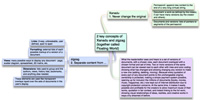by Jack Seay - April 7, 2006
Every form of media presents a certain architecture, a certain structure for the mind to work in.
Paper is a two-dimensional method for presenting information. It is difficult and expensive to publish in. You have to cut down trees, grind them up, flatten them out and dry them. The full process for getting from final draft to the book in the bookstore is painfully expensive and full of osbstacles. The book is portable, but difficult to carry more than just a few of them. The book is also highly disconnected from the rest of literature. One way links, in the form of footnotes, point outward, but are difficult to follow. You have to locate the referred-to document, which can be time consuming and expensive. Because the links are one-way, you can't see what has linked to the book you are reading without considerable effort. Although you can highlight text, and write notes in the margin, this is a limited form of reader-editing. You can't move paragraphs around to make more sense to you. If it's an outline, you can't restructure it or add more than the page size allows.
Film (and other audio-video) is another architecture for the presentation of literature (the fruit of minds). It is not usually very portable in the most common forms. You are generally presented with the structure and video and audio chosen by the director and other editors. You can't add notes. You can't link to and from it. It is disconnected from other movies and books. It is a very powerful method to present a lot of information quickly. It can also have a profound effect on the emotions. So can a book, but that requires a type of talent that few possess. The tools to produce video have dropped dramatically in recent years due to video cameras and inexpensive software editing tools. But the end product allows very little user interaction, other than pausing and restarting the video.
Music and audiobooks have undergone many changes in recent years. But the way we interact with it is still very much unchanged. Each song is an island to itself, disconnected from all others. There are no links between parts of songs. Reviewers can't easily insert more than a few seconds of the audio into their review because of copyright restrictions. Websites allow the grouping of music according to the choices of an editorial board, but don't let you change that structure to one that makes more sense to you. Recent software, such as iTunes, allow for the selling of music on the Internet, but all songs are the same price (chosen by Apple). If you get halfway through an audiobook and decide you don't like it, you have still paid for the full document. Paper and film have this same limitation. You can't draw a diagram showing your favorite songs and audiobooks, and how you rate and categorize them, and link to that. You are stuck with the organizational structure chosen by others.
Although some websites that sell music, (usually on plastic), and books, (usually on paper) allow you to write your own reviews, you can't choose to ignore the reviews of selected reviewers or create a document showing just the reviews you like the best and allow others to see your list.
Although there exists software to allow you to mix music and video into composite works, copyright restrictions will probably keep you from publishing it. The law allows you to only quote small snippets, guaranteeing that you will not be quoting in anything resembling an accurate context. The current methodology virtually gaurantees the viewpoints of others will not be fairly presented, as it will be difficult to quote the full document you refer to, or link to just part of it. Also, someone reading, hearing or seeing that document sees no links to your review of it.
The whole structure of how we present our media today: music, books, movies, etc. is very disconnected, restrictive, and still limited to unnecessary carry-overs from the paper and plastic world of publishing.
Xanadu seeks to do away with the limitations of the structures of literature as we know it today: movies, music, the web, books, magazines, radio, television. Xanadu has a radical system of copyright that permits and rewards everyone to quote anything in as full a context as needed. Content creators are financially rewarded when others include part or all of their works in another. This will happen instantly and automatically, making the services of lawyers unneeded.
If you want to present your own philosophical, religious, scientific, and/or artistic view of "the Universe as you see it, and how you plan to make it better", you will be given the freedom to stand on the shoulders of the giants who have come before, and even those now living. You will not ask permission to quote them as much as you need, or even create a new version based on theirs. Yours will always link to the original and show that the original has been modified, allowing side by side viewing of both versions.
Computers are malleable literary machines, but we have, until now, imposed on them most of the same restrictions of paper and plastic that we have used in the past. It is time for a new architecture for the mind.

Click on image to see diagram
Home index